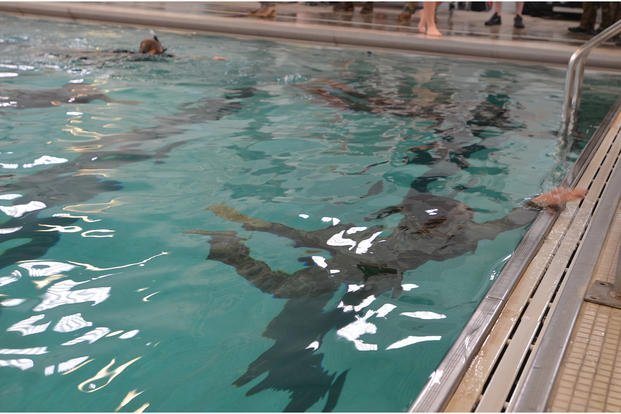I get this email often from young recruits training for such programs as Navy SEAL, SWCC, rescue swimmer, Air Force PJ and others. My answer is real simple: Stop practicing underwater swims on your own. Here is a sample email as well as an answer that I hope will save some lives of those who read it:
Stew - Right now I'm having a difficult time holding my breath underwater for more than 30 seconds. Is there anything you can recommend? Also, my desire is to go Navy SWCC.
I do not recommend practicing holding your breath for many reasons:
1. If done underwater, you could pass out and die.
2. Every second you hold your breath past a normal breathing cycle is keeping highly oxygenated blood from your brain. Not healthy.
3. You really just need to pass an underwater swim test. Learn the stroke so you swim fast with the least amount of effort. I do a 25-meter pool length in three or four strokes.
Never swim underwater without a lifeguard or buddy at the pool. People die every year practicing this alone -- or even with guards nearby.
See related article:
Navy Seal Drowns in Shallow Pool
Yes, there are tough tests in the military that require an underwater swim. Even at SEAL training, where the test is 50 meters without a kick off the first wall plus a forward flip before you start, no one in my BUD/S class failed that test. At that time, we had 120 people in the class who took and passed that underwater test. We only graduated 28 of them. There are bigger issues to train for, including running, swimming, pull-ups and many more that will get you before underwater swimming.
One last thing. Never hyperventilate before underwater swimming. In fact, the Navy will not allow it for the test, so don't practice it. One big inhale/exhale and one last inhale are all you get before swimming underwater. The Navy will teach you this. No need to practice it before training.
Focus on underwater swimming minimally by learning superior techniques, but do not push your personal envelope to pre-pass this test on your own without trained medical professionals on the pool deck with you.
Stew Smith is a former Navy SEAL and fitness author certified as a Strength and Conditioning Specialist (CSCS) with the National Strength and Conditioning Association. Visit his Fitness eBook store if you're looking to start a workout program to create a healthy lifestyle. Send your fitness questions to stew@stewsmith.com.
Want to Learn More About Military Life?
Whether you're thinking of joining the military, looking for fitness and basic training tips, or keeping up with military life and benefits, Military.com has you covered. Subscribe to Military.com to have military news, updates and resources delivered directly to your inbox.



















